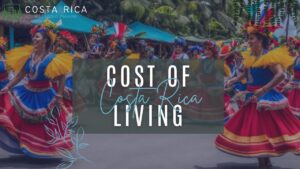How much does it cost to live in Costa Rica? Budget, expenses and lifestyle
Curious to know how much it costs to live in Costa Rica? In this video, we delve into the various aspects of living costs in the country, offering a comprehensive overview to help you plan your budget.
We look at housing prices, including rentals and property purchases, comparing them across different cities and regions.
We also talk about the costs of food, transportation, healthcare and other everyday expenses, providing valuable insights into how you can save and live comfortably based on your lifestyle. We share practical tips on how to manage personal finances and maximize your purchasing power in Costa Rica.
Whether you’re considering a permanent move or an extended vacation, this video will help you better understand the costs associated with living in this fascinating Central American country.
Here is an estimate of the costs of living in Costa Rica with prices converted into Euros (EUR). Considering an approximate exchange rate of 1 USD = 0.90 EUR:
Cost of Accommodation in Costa Rica
- Studio: 360 – 630 EUR per month
- Two-bedroom apartment: 540 – 1,080 EUR per month
- Studio apartment: 270 – 450 EURO per month
- Two-bedroom apartment: 450 – 810 EUR per month
Shopping and food in Costa Rica
- Supermarket spending for one person: 180 – 360 EUR per month
- Meal in a cheap restaurant: 4.50 – 9 EUR
- Dinner for two in a mid-range restaurant: 27 – 54 EUR
Cost of Transportation in Costa Rica
- Bus ticket: 0.63 – 1.35 EUR
- Monthly cost for public transport: 27 – 45 EUR
- Taxi: 0.90 – 1.80 EUR per km
Cost of Services
- Utilities (electricity, heating, cooling, water, garbage) for an 85 m² apartment**: 63 – 135 EUR per month
- Internet (60 Mbps or more, no data limits): EUR 27 – 54 per month
Example of other costs in Costa Rica
- Monthly gym membership: 27 – 54 EUR
- Cost to see a film at the cinema: 4.50 – 9 EUR
- Health insurance: Varies, but private coverage can cost from 45 to 180 EUR per month
Estimated total monthly cost
- Single: 900 – 1,620 EUR per month
- Couple: 1,350 – 2,250 EUR per month
- Family of four: 1,800 – 3,150 EUR per month
Cost of Living in Costa Rica: Why is it So High?
Economy and Stability
Costa Rica is one of the most stable and developed countries in Central America. Its economy is relatively robust, with a high level of human development and good quality public services, such as education and healthcare. This stability and development tends to increase living costs.
Tourism
Costa Rica is a very popular tourist destination, known for its natural beauty, biodiversity, beaches and national parks. The influx of tourists leads to an increase in prices, especially in the most touristy areas, where the demand for accommodation, restaurants and services is high.
Imports
Many consumer goods, especially technology and luxury goods, must be imported, which increases costs due to import taxes and transportation costs. This impacts not only retail prices, but also the cost of living in general.
Services and Infrastructures
The Costa Rican government invests significantly in public services, infrastructure and environmental protection. Maintaining and improving these services requires financial resources, which are reflected in living costs. For example, education and healthcare are of good quality but are not free for all.
Environmental Policies
Costa Rica has rigorous environmental policies and a significant commitment to nature conservation and sustainable development. These policies can increase production and construction costs, affecting the prices of goods and services.
Wages and Labor Costs
Labor costs in Costa Rica are higher than in many other Central American countries. Minimum wages are higher and labor laws offer good protection to workers, helping to increase costs for businesses, which are then passed on to consumers.
Internal and External Demand
There is a growing internal and external demand for real estate, both from local residents and foreigners. This demand has pushed up property prices, especially in more desirable areas such as major cities and coastal locations.
Conclusion
In summary, the combination of a relatively developed economy, the influx of tourists, the need to import many goods, and advanced environmental and social policies contribute to making Costa Rica a more expensive country than other nations in the region.
Similar posts

Still looking for more information?
Contact our customer service and get all the answers that you need for your life in Costa Rica. We can help you to arrange your relocation as well as send you all the plots and villas available to purchase. Get in touch now!





 Sito web in Italiano
Sito web in Italiano